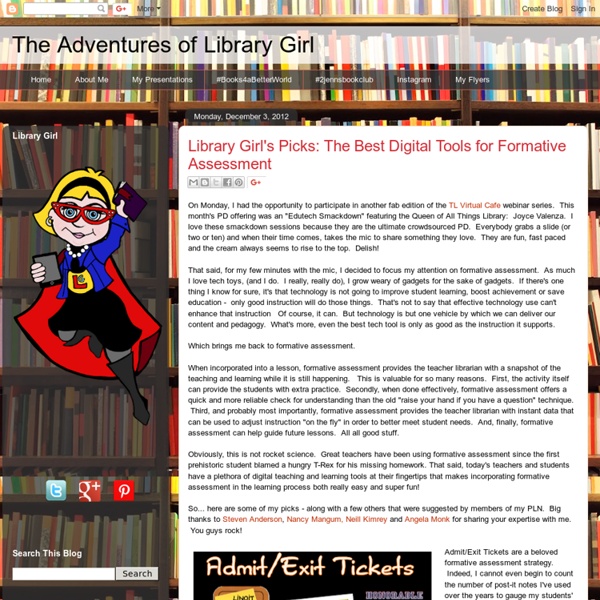15 Good Tools for Quickly Gathering Feedback from Students
Polls, chat tools, and interactive quizzes provide good ways to hear from all of the students in a classroom. These kind of tools allow shy students to ask questions and share comments. For your more outspoken students who want to comment on everything, a feedback mechanism provides a good outlet for them too. Here's a run-down of some of the best tools for gathering feedback from students in real-time. Newer tools:Tozzl is a chat platform that allows you to quickly create private, password-protected message boards as well as public boards.
List of Resources Sharing Strategies on Learning Assessment
About ETR Community EdTechReview (ETR) is a community of and for everyone involved in education technology to connect and collaborate both online and offline to discover, learn, utilize and share about the best ways technology can improve learning, teaching, and leading in the 21st century. EdTechReview spreads awareness on education technology and its role in 21st century education through best research and practices of using technology in education, and by facilitating events, training, professional development, and consultation in its adoption and implementation.
Students Who Challenge Us:Eight Things Skilled Teachers Think, Say, and Do
Among the many challenges teachers face, often the most difficult is how to engage students who seem unreachable, who resist learning activities, or who disrupt them for others. This is also one of the challenges that skilled teachers have some control over. In my nine years of teaching high school, I've found that one of the best approaches to engaging challenging students is to develop their intrinsic motivation. The root of intrinsic is the Latin intrinsecus, a combination of two words meaning within and alongside.
10 Assessments You Can Perform In 90 Seconds
10 Assessments You Can Perform In 90 Seconds by TeachThought Staff Good assessment is frequent assessment. Any assessment is designed to provide a snapshot of student understand—the more snapshots, the more complete the full picture of knowledge. On its best day, an assessment will be 100% effective, telling you exactly what a student understands.
Fantastic Comprehensive List of Assessment Tools for Teachers
About ETR Community EdTechReview (ETR) is a community of and for everyone involved in education technology to connect and collaborate both online and offline to discover, learn, utilize and share about the best ways technology can improve learning, teaching, and leading in the 21st century. EdTechReview spreads awareness on education technology and its role in 21st century education through best research and practices of using technology in education, and by facilitating events, training, professional development, and consultation in its adoption and implementation.
Four Ideal Student Assessments
(0 Users) As a Principal in the Board, my role is to develop understanding of each of these points, and put them into action. As such, we have been working at our school to systematically do so. Previously I posted ideas from our work on student engagement as much of our work this year has been focussed in this area. It is impossible however to focus on one point, in exclusion of the others.
100 Helpful Blogs For School Librarians (And Teachers)
We love librarians. They’re the gatekeepers of knowledge and always looking to explore new ways to enhance the learning experience . I learned about the latest trends in libraries at this year’s CALICON in San Diego and love the move toward open source, cross-library sharing, and going digital. But what if you weren’t able to attend CALICON or simply want to get a regular update on all the fun stuff happening with libraries?
15 Good Tools for Quickly Gathering Feedback from Students
Polls, chat tools, and interactive quizzes provide good ways to hear from all of the students in a classroom. These kind of tools allow shy students to ask questions and share comments. For your more outspoken students who want to comment on everything, a feedback mechanism provides a good outlet for them too. Here's a run-down of some of the best tools for gathering feedback from students in real-time. Newer tools:Tozzl is a chat platform that allows you to quickly create private, password-protected message boards as well as public boards. To get started visit Tozzl and select "create a new Tozzl."



